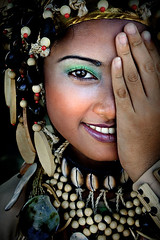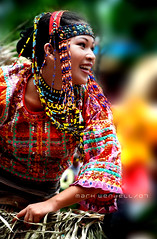Thursday, April 24, 2008
Panagbenga
Flores de Mayo
Wednesday, January 30, 2008
Maria Clara
Tuesday, January 29, 2008
The beautiful Philippine sunset
"The sunset over Manila Bay is rightly famous. I have sometimes watched this beautiful sight from a simple floating restaurant near the Manila Hotel....
The beauty of the Philippine Islands is incredible and many resorts are available to enable the traveller to take it all in. Whether you are interested in 400-year-old Spanish churches or scuba diving on some of the best coral reefs in the world, it is all here.
Add to that the charm of the Filipinos, who even in adversity can be found smiling; the beauty of the women (one of whom I am very happily married to); and the relatively low cost of living and you realize why you often hear expats say, "another day in paradise"."- excerpt from an article by Anthony Lee
Nothing compares to the beauty of the Filipina
(Model: Dindi. Photo originally uploaded by Lenard P0)
Sunday, January 27, 2008
Paid De-virginizers!!?
Pinay Scandal
"The inhabitants of Mariveles have not a very good reputation. The place is only visited by ships which run in there in bad weather, when
their idle crews spend the time in drinking and gambling. Some of
the young girls were of striking beauty and of quite a light color;
often being in reality of mixed race, though they passed as of pure
Tagal blood. This is a circumstance I have observed in many seaports, and in the neighborhood of Manila; but, in the districts which are almost entirely unvisited by the Spaniards, the natives are much darker and of purer race." - Fedor Jagor, 1820
Prinsesa Urduja
The legend of Princess Urduja can be attributed to the famous story of Mohammedan traveler, Ibn Batuta of India. In 1347 he was a passenger on a Chinese junk, which has just come from the port of Kakula, north of Java and Sumatra and passed by Pangasinan on the way to Canton, China. Urduja, who had a particular fascination for the renowed "Pepper Country"--pepper being considered black gold then--was quoted by Batuta as saying, "I must positively go to war with that country, and get possession of it, for its great wealth and great forces attract me."
For a time, feminists tried to revive the Urduja story but were discouraged to learn that Batuta's account of the voyage to Tawalisi was labeled as either an intrigue or a fantasy. Scholars, considering the story absurd, declared Urduja a myth." - Chit Balmaceda Guiterrez
The Queen
Friday, January 25, 2008
TRIBAL CHIC
At times the better class wear the more becoming short skirt and tapis of silk or satin, with gold-lace embroidered chinelas. This dress is elegant, and adds a charm to the wearer.
The tapi is smaller. It is not used in the street; it is a sort of neglige apparel worn in the house only, or for going to the bath. The poorest classes go to the river-side to bathe in it. It is drawn all around from the waist downwards.
The figure of a peasant woman is erect and stately, due to her habit from infancy of carrying jars of water, baskets of orchard produce, etc., on her head with a pad of coiled cloth. The characteristic bearing of both sexes, when walking, consists in swinging the arms (but more often the right arm only) to and fro far more rapidly than the stride, so that it gives them the appearance of paddling." - by John Foreman, 1898-1902
Tuesday, January 22, 2008
The beauty of Philippine beaches
sometimes a mere pinnacle of rock, sometimes a cone-shaped peak timbered down to the beach where the surf fell over.
Toward evening, when the breeze freshened slightly, we seemed almost to brush the sides of some of these islets, and they invited us with sparkling pools and coves, with beaches over which the sea wimpled, and with grassy hillsides running out into promontories above cliffs of volcanic rock. And, yonder in the golden west, shimmering, dancing, in rosy-tinted splendor, more islands beckoned us to the final glory of a matchless day--clouds heaped on clouds, outlined in thin threads of gold, and drawing, in broad shafts of smoky flame, the vapors of an opal sea. At that time I had not seen the famous Inland Sea of Japan, but I have since passed through it twice, and feel that in beauty the Strait of San Bernardino has little to yield to her far-famed neighbor." - Mary H. Fee, 1835
Sunday, January 20, 2008
Beauty of Vigan
The name Vigan was derived from ""Biga"", a giant taro plant that grows abundantly along the banks of the Mestizo River. This river was central in the development of trade and community activities in Vigan during the 16th to the 19th centuries. Established in the 16th century, Vigan is the best preserved example of a planned Spanish colonial town in Asia. Its architecture reflects the coming together of cultural elements from elsewhere in the Philippines and from China with those from Europe to create a unique culture and townscape without parallel anywhere in East and Southeast Asia.
The Philippines...a woman.

Originally uploaded by paul-borromeo
- Jose N. Sevilla, 1922
Saturday, January 19, 2008
Turn-of-the-century Filipina of Sulu
The women of Sulu in 1898
The Babaylan of Cebu
Friday, January 18, 2008
Tattoo
The palm-studded island of Boracay - with its white, talcum-fine beach, balmy weather and warm, crystalline waters - is like a hypnotic magnet that lures many to a lotus existence. In this tiny, butterfly-shaped island at the northwestern tip of Panay in Western Visayas, days can be spent by simply lazing on the beach and nights are for indulging in the tropical party lifestyle.
Sinulog Princess
The lusty Filipina..an Historical account
Ethnic Beauty
Thursday, January 17, 2008
Beauty and the Bamboo
Monday, January 14, 2008
Matet Spagnolo
Duyan
Ang bantay ko’y tala, ang tanod ko’y bituin
Sa piling ni nanay, langit ay buhay
Puso kong may dusa sabik sa ugoy ng duyan
Sana’y di nagmaliw ang dati kong araw
Nang munti pang bata sa piling ni nanay
Nais kong maulit ang awit ni inang mahal
Awit ng pag-ibig habang ako’y nasa duyan"
- Levi Celerio, Lucio San Pedro
"Pinay"
Friday, January 11, 2008
TO THE WOMEN OF MALOLOS
When I wrote Noli Me Tangere, I asked myself whether bravery was a common thing in the young women of our people. I brought back to my recollection and reviewed those I had known since my childhood, but there were only few who seem to come up to my ideal. There was, it is true, an abundance of girls with agreeable manners, beautiful ways, and modest demeanor, but there was in all an admixture of servitude and deference to the words or whims of their so-called "spiritual fathers" (as if the spirit or soul had any father other than God), due to excessive kindness, modesty, or perhaps, ignorance. They seemed faded plants sown and reared in darkness, having flowers without perfume and fruits without sap.
However, when the news of what happened at Malolos reached us, I saw my error, and great was my rejoicing. After all, who is to blame me? I did not know Malolos nor its young women, except one called Emilia [Emilia Tiongson, whom Rizal met in 1887 - Z.], and her I knew by name only.
Now that you have responded to our first appeal in the interest of the welfare of the people; now that you have set an example to those who, like you, long to have their eyes opened and be delivered from servitude, new hopes are awakened in us and we now even dare to face adversity, because we have you for our allies and are confident of victory. No longer does the Filipina stand with her head bowed nor does she spend her time on her knees, because she is quickened by hope in the future; no longer will the mother contribute to keeping her daughter in darkness and bring her up in contempt and moral annihilation. And no longer will the science of all sciences consist in blind submission to any unjust order, or in extreme complacency, nor will a courteous smile be deemed the only weapon against insult or humble tears the ineffable panacea for all tribulations, You know that the will of God is different from that of the priest; that religiousness does not consist of long periods spent on your knees, nor in endless prayers, big rosarios, and grimy scapularies, but in a spotless conduct, firm intention and upright judgment. You also know that prudence does not consist in blindly obeying any whim of the little tin god, but in obeying only that which is reasonable and just, because blind obedience is itself the cause and origin of those whims, and those guilty of it are really to be blamed. The official or friar can no longer assert that they alone are responsible for their unjust orders, because God gave, each individual reason and a will of his or her own to distinguish the just from the unjust; all were born without shackles and free, and nobody has a right to subjugate the will and the spirit of another. And, why should you submit to another your thoughts, seeing that thought is noble and free?
It is cowardice and error to believe that saintliness consists in blind obedience and that prudence and the habit of thinking are presumption. Ignorance has never been ignorance, and never prudence and honor. God, the primal source of all wisdom, does not demand that man, created in his image and likeness, allow himself to be deceived and hoodwinked, but wants us to use and let shine the light of reason with which he has so mercifully endowed us. He may be compared to the father who gave each of his sons a torch to light their way in the darkness, bidding them keep its light bright and take care of it, and not put, it out and trust to the light of the others, but to help and advice each other to find the right path. They would be madmen were. they to follow the light of another, only to come to a fall, and the father could upbraid them and say to them: "Did I not give each of you his own torch"; but he could not say so if the fall were due to the light of the torch of him who fell, as the light might have been dim and the road very bad.
The deceiver is fond of using the saying that "It is presumptuous to rely on one's own judgment," but, in my opinion, it is more presumptuous for a person to put his judgment above that of the others and try to make it prevail over theirs. It is more presumptuous for a man to constitute himself into an idol and pretend to be in communication of thought with God; and it is more than presumptuous and even blasphemous for a person to attribute every movement of his lips to God, to represent every whim of his as the will of God, and to brand his own enemy as an enemy of God. Of course, we should not consult our own judgment alone, but hear the opinion of others before doing what may seem most reasonable to us. The wild man from the hills, if clad in a priest's robes, remains a hillman and can only deceive the weak and ignorant. And, to make my argument more conclusive, just buy a priest's robe as the Franciscans wear it and put it on a carabao, and you will be lucky if the carabao does not become lazy on account of the robe. But I will leave this subject to speak of something else.
Youth is a flower-bed that is to bear rich fruit and must accumulate wealth for its descendants. What offspring will be that of a woman whose kindness of character is expressed by mumbled prayers; who knows nothing by heart but awits, novenas, and the alleged miracles; whose amusement consists in playing panguingue or in the frequent confession of the same sins? What sons will she have but acolytes, priest's servants, or cockfighters? It is the mothers who are responsible for the present servitude of our compatriots, owing to the unlimited trustfulness of their loving hearts, to their ardent desire to elevate their sons. Maturity is the fruit of infancy and the infant is formed on the lap of its mother. The mother who can only teach her child how to kneel and kiss hands must not expect sons with blood other than that of vile slaves. A tree that grows in the mud is insubstantial and good only for firewood. If her son should have a bold mind, his boldness will be deceitful and will be like the bat that can not show itself until the ringing of vespers. They say that prudence is sanctify. 'But, what sanctity have they shown us? To pray and kneel a lot, kiss the hand of the priests, throw money away on churches, and believe all the friar sees fit to tell us; gossip, callous rubbing of noses ....
As to the mites and gifts to God, is there anything in the world that does not belong to God? What would you say of a servant making his master a present of a cloth borrowed from that very master? Who is so vain, so insane that he will give alms to God and believe that the miserable thing he has given will serve to clothe the Creator of all things? Blessed be they who succor their fellow men, aid the poor and feed the hungry; but cursed be they who turn a deaf ear to supplications of the poor, who only give to him who has plenty and spend their money lavishly on silver altar hangings for the church, or give it to the friar, who lives in abundance, in the shape of fees for masses of thanksgiving, or in serenades and fireworks. The money ground out of the poor is bequeathed to the master so that he can provide for chains to subjugate, and hire thugs and executioners. Oh, what blindness, what lack of understanding!
Saintliness consists in the first place in obeying the dictates of reason, happen what may. "It is acts and not words that I want of you," said Christ. "Not every one that saith unto me, Lord, Lord, shall enter into the kingdom of heaven; but he that doeth the will of my Father which is in Heaven." Saintliness does not consist in abjectness, nor is the successor of Christ to be recognized by the fact that he gives his hand to be kissed. Christ did not give the kiss of peace to the Pharisees and never gave his hand to be kissed. He did not cater to the rich and vain; He did not mention scapularies, nor did He make rosaries, or solicit offerings for the sacrifice of the mass or exact payment for His prayers. Saint John did not demand a fee on the River Jordan, nor did Christ teach for gain. Why, then, do the friars now refuse to stir a foot unless paid in advance? And, as if they were starving, they sell scapularies, rosaries, belts, and other things which are nothing but schemes for making money and a detriment to the soul; because even if all the rags on earth were converted into scapularies and all the trees in the forests into rosaries, and if the skins of all the beasts were made into belts, and if all the priests of the earth mumbled prayers over all this and sprinkled oceans of holy water over it, this would not purify a rogue or condone sin where there is no repentance. Thus, also, through cupidity and love of money, they will, for a price, revoke the numerous prohibitions, such as those against eating meat, marrying close relatives, etc. You can do almost anything if you but grease their palms. Why that? Can God be bribed and bought off, and blinded by money, nothing more nor less than a friar? The brigand who has obtained a bull of compromise can live calmly on the proceeds of his robbery, because he will be forgiven. God, then, will sit at a table where theft provides the viands? Has the Omnipotent become a pauper that He must assume the role of the excise man or gendarme? If that is the God whom the friar adores, then I turn my back upon that God.
Let us be reasonable and open our eyes, especially you women, because you are the first to influence the consciousness of man. Remember that a good mother does not resemble the mother that the friar has created; she must bring up her child to be the image of the true God, not of a blackmailing, a grasping God, but of a God who is the father of us all, who is just; who does not suck the life-blood of the poor like a vampire, nor scoffs at the agony of the sorely beset, nor makes a crooked path of the path of justice. Awaken and prepare the will of your children towards all that is honorable, judged by proper standards, to all that is sincere and firm of purpose, clear judgment, clean procedure, honesty in act and deed, love for the fellowman and respect for God; this is what you must teach your children. And, seeing that life is full of thorns and thistles, you must fortify their minds against any stroke of adversity and accustom them to danger. The people can not expect honor nor prosperity so long as they will educate their children in a wrong way so long as the woman who guides the child in his first steps is slavish and ignorant. No good water comes from a turbid, bitter spring; no savory fruit comes from acrid seed.
The duties that woman has to perform in order to deliver the people from suffering are of no little importance, but be they as they may, they will not be beyond the strength and stamina of the Filipino people. The power and good judgment of the woman of the Philippines are well known, and it is because of this that she has been hoodwinked, and tied, and rendered pusillanimous; and now her enslavers rest at ease, because so long as they can keep the Filipina mother a slave, so long will they be able to make slaves of her children. The cause of the backwardness of Asia lies in the fact that there the women are ignorant, are slaves; while Europe and America are powerful because there the women are free and well educated and endowed with lucid intellect and a strong will.
We know that you lack instructive books; we know that nothing is added to your intellect, day by day, save that which is intended to dim its natural brightness; all this we know, hence our desire to bring you the light that illuminates your equals here in Europe. If that which I tell you does not provoke your anger, and if you will pay but a little attention to it, then, however dense the mist may be that befogs our people, I will make the outmost effort to have it dissipated by the bright rays of the sun, which will give light, though they may be dimmed. We shall not feel any fatigue if you will help us: God, too, will help to scatter the mist, because He is the God of truth; He will restore to its pristine condition the fame of the Filipina, in whom we now miss only a criterion of her own, because good qualities she has enough and to spare. This is our dream; this is the desire we cherish in our hearts; to restore the honor of woman, who is half of our heart, our companion in the joys and tribulations of life. If she is a maiden, the young man should love her not only because of her beauty and her amiable character, but also on account of her fortitude of mind and loftiness of purpose, which quicken and elevate the feeble and timid and ward off all vain thoughts. Let the maiden be the pride of her country and command respect, because it is a common practice on the part of Spaniards and friars here who have returned from the Islands to speak of the Filipina as complaisant and ignorant, as if all should be thrown into the same class because of the missteps of a few, and as if women of weak character did not exist in other lands. As to purity, what could the Filipina not hold up to others!
Nevertheless, the returning Spaniards and friars, talkative and fond of gossip, can hardly find time enough to brag and bawl, amidst guffaws and insulting remarks, that a certain woman was thus; that she behaved thus at the convent and conducted herself thus with the Spaniard who on one occasion was her guest, and other things that set your teeth on edge when you think of them which, in the majority of cases, were fault due to candor, excessive kindness, meekness, or perhaps, ignorance, and were all the work of the defamer himself. There is a Spaniard, now in high office, who has sat at our table and enjoyed our hospitality in his wanderings through the Philippines, and who, upon his return to Spain, rushed forthwith into print and related that on one occasion in Pampanga he demanded hospitality and ate, and slept at a house, and the lady of the house conducted herself in such and such a manner with him; this is how he repaid the lady for her supreme hospitality! Similar insinuations are made by the friars to the chance visitor from Spain concerning their very obedient confesandas, hand-kissers, etc., accompanied by smiles and very significant winkings of the eye. In a book published by D. Sinibaldo de Mas and in other friar sketches sins are related of which women accused themselves in the confessional and of which the friars made no secret in talking to their Spanish visitors seasoning them, at the best, with idiotic and shameless tales not worthy of credence. I cannot repeat here the shameless stories that a friar told Mas and to which Mas attributed no value whatever. Everytime we hear or read anything of this kind, we ask each other: Are the Spanish women all cut after the pattern of the Holy Virgin Mary and the Filipinas all reprobates? I believe that if we were to balance accounts in this delicate question, perhaps. . ... But I must drop the subject because I am neither a confessor nor a Spanish traveler and have no business to take away anybody's good name. I shall let this go and speak of the duties of woman instead.
A people that respects woman, like the Filipino people, must know the truth of the situation in order to be able to do what is expected of it. It seems an established fact that when a young student falls in love, he throws everything to the dogs - knowledge, honor, and money, as if a girl could not do anything but sow misfortune. The bravest youth becomes a coward when he marries, and the born coward becomes shameless, as if he had been waiting to get married in order to show his cowardice. The son, in order to hide his pusillanimity, remembers his mother, swallows his wrath, suffers his ears to be boxed, obeys the most foolish order, and becomes an accomplice to his own dishonor. It should be remembered that. where nobody flees, there is no pursuer; when there is no little fish, there can not be a big one. Why does the girl not require of her lover a noble and honored name, a manly heart offering protection to her weakness, and a high spirit incapable of being satisfied with engendering slaves? Let her discard all fear, let her behave nobly and not deliver her youth to the weak and faint-hearted. When she is married, she must aid her husband, inspire him with courage, share his perils, refrain from causing him worry and sweeten his moments of affliction, always remembering that there is no grief that a brave heart can not bear and there is no bitterer inheritance than that of infamy and slavery. Open your children's eyes so that they may jealously guard their honor, love their fellowmen and their native land, and do their duty. Always impress upon them they must prefer dying with honor to living in dishonor. The women of Sparta should serve you as an example in this; I shall give some of their characteristics.
When a mother handed the shield to her son as he was marching to battle, she said nothing to him but this: "Return with it, or on it," which meant, come back victorious or dead, because it was customary with the routed warrior to throw away his shield, while the dead warrior was carried home on his shield. A mother received word that her son had been killed in battle and the army routed. She did not say a word, but expressed her thankfulness that her son had been saved from disgrace. However, when her son returned alive, the mother put on mourning. One of the mothers who went out to meet the warriors returning from battle was told by one that her three sons had fallen. I do not ask you that, said the mother, but whether we have been victorious or not. We have been victorious - answered the warrior. If that is so, then let us thank God, and she went to the temple.
Once upon a time a king of theirs, who had been defeated, hid in the temple, because he feared the popular wrath. The Spartans resolved to shut him up there and starve him to death. When they were blocking the door, the mother was the first to bring stones. These things were in accordance with the custom there, and all Greece admired the Spartan woman. Of all women - a woman said jestingly - only you Spartans have power over the men. Quite natural - they replied - of all women only we give birth to men. Man, the Spartan women said, was not born to live for himself alone, but for his native land. So long as this way of thinking prevailed and they had that kind of women in Sparta, no enemy was able to put his foot upon her soil, nor was there a woman in Sparta who ever saw a hostile army.
I do not expect to be believed simply because it is I who am saying this; there are many people who do not listen to reason, but will listen only to those who wear the cassock or have gray hair or no teeth; but while it is true that the aged should be venerated, because of their travails and experience, yet the life I have lived, consecrated to the' happiness of the people, adds some years, though not many to my age. I do not pretend to be looked upon as an idol or fetish and to be believed and listened to with the eyes closed, the head bowed, and the arms crossed over the breast; what I ask of all is to reflect on what I tell them, think it over and sift it carefully through the sieve of reason.
First of all. That the tyranny of some is possible only through cowardice and negligence on the part of others. Second. What makes one contemptible is lack of dignity and abject fear of him who holds one in contempt. Third. Ignorance is servitude, because as a man thinks, so he is; a man who does not think for himself and allowed himself to be guided by the thought of another is like the beast led by a halter. Fourth. He who loves his independence must first aid his fellow man, because he who refuses protection to others will find himself without it; the isolated rib of the buri palm is easily broken, but not so the broom made of the ribs of the palm bound together. Fifth. If the Filipina will not change her mode of being, let her rear no more children, let her merely give birth to them. She must cease to be the mistress of the home, otherwise she will unconsciously betray husband, child, native land, and all. Sixth. All men are born equal, naked, without bonds. God did not create man to be a slave; nor did he endow him with intelligence to have him hoodwinked, or adorn him with reason to have him deceived by others. It is not fatuous to refuse to worship one's equal, to cultivate one's intellect, and to make use of reason in all things. Fatuous is he who makes a god of him who makes brutes of others, and who strives to submit to his whims all that is reasonable and just. Seventh. Consider well what kind of religion they are teaching you. See whether it is the will of God or according to the teachings of Christ that the poor be succored and those who suffer alleviated. Consider what they are preaching to you, the object of the sermon, what is behind the masses, novenas, rosaries, scapularies, images, miracles, candles, belts, etc., etc., which they daily keep before your minds, ears and eyes, jostling, shouting, and coaxing; investigate whence they came and whither they go and then compare that religion with the pure religion of Christ and see whether that pretended observance of the life of Christ does not remind you of the fat milk cow or the fattened pig, which is encouraged to grow fat not through love of the animal, but for grossly mercenary motives.
Let us therefore reflect; let us consider our situation and see how we stand. May these poorly written lines aid you in your good purpose and help you to pursue the plan you have initiated. "My profit will be greater than the capital invested"; and I shall gladly accept the usual reward of all who dare tell our people the truth. May your desire to educate yourself be crowned with success; may you in the garden of learning gather not bitter, but choice fruit, looking well before you eat, because on the surface of the globe all is deceit, and often the enemy sows weeds in your seeding plot.
All this is the ardent desire of your compatriot,
JOSE RIZAL
Christine

"I’m always looking for a creative outlet and had thought of one day doing a one woman show… As I discovered that people could have their own “channel” on YouTube - I thought “Well, here is a way to have my own show whenever I have the time for it, and the world is the audience!”
http://www.happyslip.com/
The Beauty of the Filipina
So what is a Filipina? The original inhabitants of the archipelago known as the Philippines are of Malay origin. For centuries Chinese, Indian and Middle Eastern traders visited the Philippines often leaving more than just a cultural influence. The Philippines was under Spanish control for 400 years and the Filipina has adopted many of the Latina characteristics and have a unique beauty all their own.
The Philippines is not considered part of the Latin world today but has been strongly influenced by its Latin past. Discovered by Portuguese explorer Magellan on his historic circumnavigation of the world the Philippines was named after King Philip of Spain who was funding the expedition.
It has been said that the Filipinos were not encouraged to learn Spanish due to a change in colonial policy. Despite this the preferred everyday counting system is Spanish and the currency is the Peso. The National Filipino language is very rich in Spanish words and while the language does not grammatically incorporate gender they have adopted many gender endings. They will use Filipino for male and Filipina for female.
In Central and southern Philippines a handsome man is guapo and a pretty girl is guapa. Further South around Zamboanga in Mindanao there is an area where the people speak a language very close to Spanish called Ciabacano.
Filipino cuisine is also richly influenced by both Spanish and South America (the Philippines was actually administered from Mexico). Dishes such as Paella, Apretida, Aroscaldo, Menudo and Calderita are considered Filipino.
In traditional Filipino music and dance there is unmistakably a Spanish sound and it is considered an integral part of their cultural heritage. The traditional dress style is also Spanish but as in most Latin American countries the younger generation prefer the American fashions. The Filipino have also adopted much of the Latin values and attitudes. Perhaps the biggest legacy is Catholicism which is embraced by vast majority of the Filipinos.
At the turn of last century control of the Philippines past to American hands and it has often been said that the Philippines spent 400 years in a Convent and then 40 years in Hollywood. English was quickly adopted as a second language and most people you will encounter will have a good command of the language so basic communication is seldom a problem. Most Filipino people admire and aspire to Western culture, in particular American.
The Philippines is outwardly one of the most Western countries in Asia yet I have heard it said that if you scratch the surface of a Filipino you will find an Asian. The Philippines still shares many cultural traditions and values with its neighbours.
The cuisine is a blend of Malay and Chinese with strong Spanish influences. American fast food is also extremely popular. American fashion rules but there is always a subtle hint of Latina in the way they dress. American music rules but again old Latin influences are often found in home grown music. Any new Western music featuring Latin sounds is guaranteed to be popular in the Philippines
The Filipina is a product of all these influences both genetic and cultural. Their amazing beauty is a result of the infusion of many different ethnic influences coming together to produce the beautiful hybrid we call a Filipina































